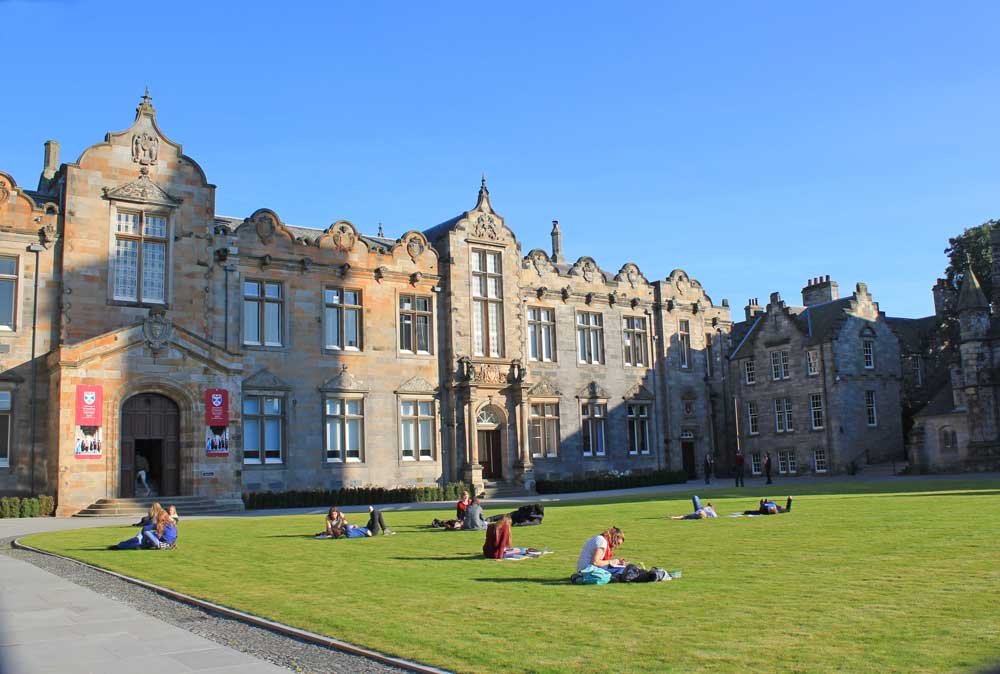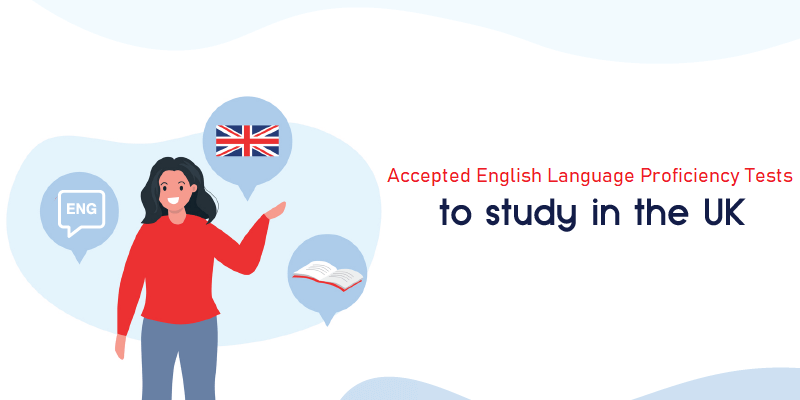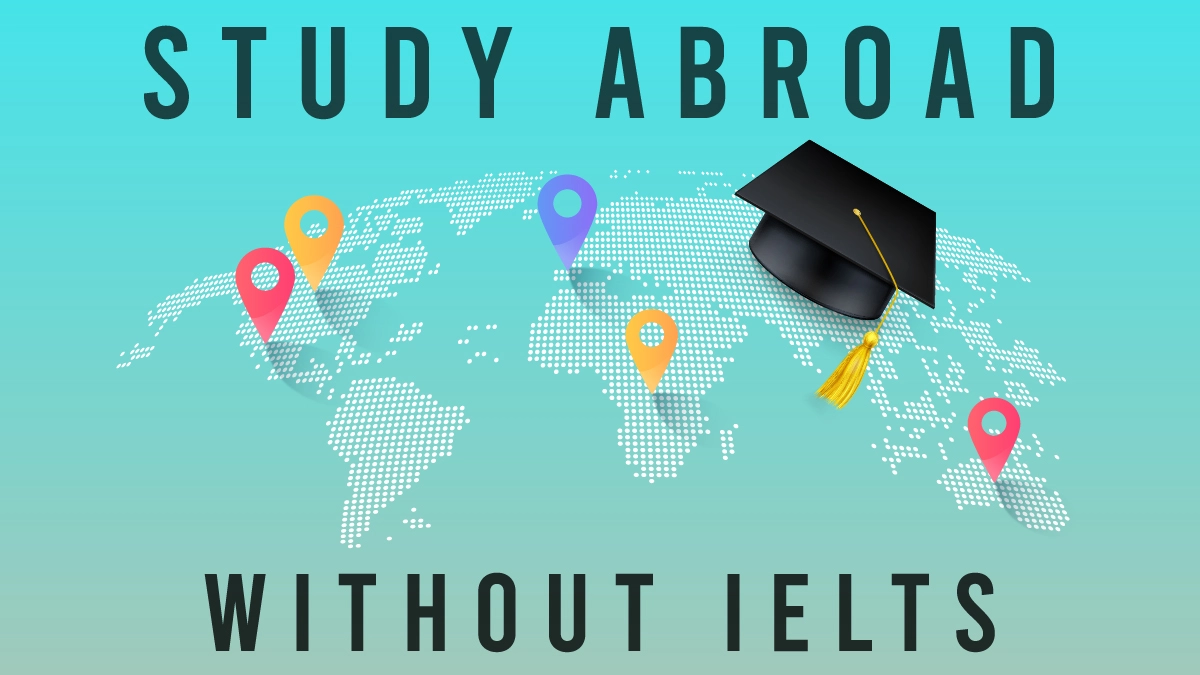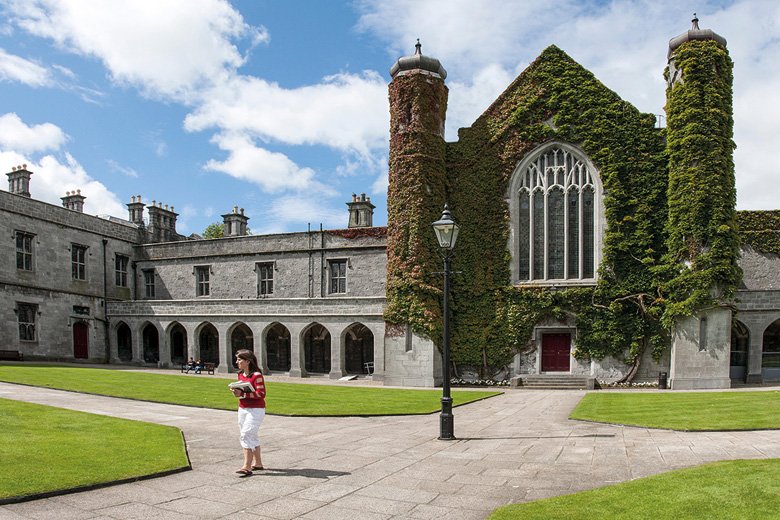For overseas students, Scotland provides a warm, well-respected educational environment that is known for its diversity, inclusivity,and rigorous academic standards. International students have access to a broad range of undergraduate and graduate programs at the university level, provided by prestigious establishments like Heriot-Watt University, Glasgow Caledonian University,Edinburgh Napier University,University of Stirling, and University of Dundee.While postgraduate applications are usually handled directly by the universities,the University and College applications Service(UCAS)facilitates the application process for undergraduate programs. Scotland offers students a thorough and extensive academic experience through its distinctive three year undergraduate degree system.Nonetheless,a range of financial aid programs and scholarships are offered to help overseas students continue their education. 1. Glasgow Caledonian University (GCU): Glasgow Caledonian University was founded in 1993 and is located in the energetic city of Glasgow.It is well-known for its strong emphasis on social responsibility and employability. The university’s two campuses, one in London and the other in the center of the city,offer vibrant study environments.GCU is renowned for offering a wide variety of graduate and undergraduate degrees that combine academic excellence with real-world application.The school encourages community involvement,and GCU places a strong focus on social impact in its partnerships with businesses and research projects. 2. University of Edinburgh Napier: Edinburgh Napier University is a leader in innovation and hands-on learning, having been established in the nation’s capital since 1964. The institution offers a range of undergraduate and graduate programs with an emphasis on employability. The campuses are positioned thoughtfully in important parts of Edinburgh, giving students easy access to a vibrant city environment. Edinburgh Napier’s dedication to innovative research and industry collaborations guarantees that students are well equipped to face the demands of the professional realm. 3. University of Stirling: The University of Stirling, which was founded in 1967, is well known for its fair attitude to both athletics and academic achievement. The main campus is home to a wide range of disciplinary programs and is surrounded by a calm setting. Stirling’s state-of-the-art sports facilities and support services are testament to its dedication to the welfare of its students. A comprehensive educational experience is enhanced by the university’s commitment to sustainability and its emphasis on research. 4. Heriot-Watt University: With a focus on the world,Heriot-Watt University was established in 1821 and has campuses in Edinburgh and the Scottish Borders.The Edinburgh Campus provides a wide choice of programs against the backdrop of the capital’s historical buildings.Located in the scenic area,the Scottish Borders Campus prioritizes business,design,and textiles.HeriotWatt University is a prominent player in the higher education scene because of its dedication to research and internationalization.It is well known for its expertise in science,technology,and business education. 5. University of Dundee: The East Coast university of Dundee, founded in 1881,is renowned for its accomplishments in the arts,medicine,and life sciences.The campus offers state-of-the-art amenities in a lively academic environment.Dundee’s contributions to a variety of sectors demonstrate its emphasis on innovation and research.The university is a well-known entity in Scotlands higher education scene because of its dedication to encouraging creativity and academic excellence. 6. University of the West of Scotland (UWS): The University of the West of Scotland (UWS), which had its origins in 1897, has campuses in Paisley, Ayr, Dumfries, Hamilton, and London. A wide variety of undergraduate and graduate programs are available on these sites. UWS is renowned for its dedication to community involvement,diversity,and innovation.The numerous campuses offer cutting-edge amenities and a nurturing learning atmosphere to students, enhancing their overall educational experience. 7. Abertay University: Abertay University,a Dundee-based institution founded in 1994, is well-known for its proficiency in business, computer gaming, and technology.The campus, which is located in the center of Dundee, offers a vibrant environment for education and creativity. Abertay’s programs demonstrate its emphasis on practical skills and industry relevance. The institution is regarded as a center for innovative education because of its track record of developing talent in the creative and digital sectors. 8. Robert Gordon University: Robert Gordon University,situated in Aberdeen and founded in 1729,is renowned for its courses that are relevant to the industry and for its close ties to the business community.The campus provides a wide array of programs with a focus on employability and practical skills.Robert Gordons dedication to applied research and teamwork with business associates guarantees that students get a practical and pertinent education.The universitys campus in Aberdeen,a major center for the petroleum sector,offers students a distinctive setting for education and career advancement. Conclusion: The universities of Scotland Glasgow Caledonian,Edinburgh Napier,University of Stirling, Heriot Watt,University of Dundee,University of the West of Scotland,Abertay,and Robert Gordon are dedicated to providing high-quality instruction,fostering innovation,and fostering hands-on learning.Every institution provides a unique educational experience with a focus on industry connections,research,and employment.Scotland is a popular location for international students due to its dynamic metropolitan environments and stunning countryside.
Acceptable English Language Proficiency Tests in the UK | Minimum Score Needed by UK Universities
Several international students view starting their academic career in the UK as an aspirational goal.However,proving English language competency is a crucial component of the admissions process that is intricately intertwined throughout this endeavor’This prerequisite emphasizes how crucial it is to have strong communication and understanding abilities in order to succeed in the rigorous academic setting of UK universities.UK institutions have developed a framework that incorporates a range of English language examinations in order to expedite this procedure and guarantee an equitable assessment of linguistic aptitude.The application procedure is made more difficult by the distinct scoring systems that are included with each of these tests.We examine several commonly used English language assessments in this thorough guide. An assessment of English language proficiency called IELTS: Several international students view starting their academic career in the UK as an aspirational goal.However,proving English language competency is a crucial component of the admissions process that is intricately intertwined throughout this endeavor’This prerequisite emphasizes how crucial it is to have strong communication and understanding abilities in order to succeed in the rigorous academic setting of UK universities.UK institutions have developed a framework that incorporates a range of English language examinations in order to expedite this procedure and guarantee an equitable assessment of linguistic aptitude.The application procedure is made more difficult by the distinct scoring systems that are included with each of these tests.We examine several commonly used English language assessments in this thorough guide. The International English Language Testing System, or IELTS, is a standardized exam used to evaluate non-native English speakers English language skills.Speaking,Writing,Reading, and Listening are its four divisions.The overall score is between 0 and 9.There are two categories for the IELTS test: IELTS Academic: IELTS Academic is intended for use in professional registration and higher education programs in English-speaking nations. IELTS General Training: This type of training is utilized for non-academic or immigration purposes. Each of the four sections—Listening,Reading,Writing,and Speaking—in both editions has an own set of tasks.Depending on the university, program, and level of study, different IELTS scores are needed for admission. A score of 5.5 to 6.0 is often required for undergraduate degrees, whereas postgraduate programs may demand. Test of English as a Foreign Language,or TOEFL: Another standardized test used to evaluate non native English speakers English language skills is the TOEFL(Test of English as a Foreign Language).It assesses four abilities:;writing,speaking,listening,and reading.The TOEFL score has a total range of 0 to 120. TOEFL iBT Home Study Version: With this TOEFL iBT edition, candidates can take the test in the convenience of their own homes. Although it is given online via a secure network, it follows the same structure and content as the standard TOEFL iBT. A computer,a dependable internet connection, and a calm, secure testing setting are necessities for test takers.Like IELTS, TOEFL is frequently necessary for entrance to schools and universities that accept English as their first language. Different TOEFL scores are needed. Pearson English Test (PTE) (SELT/Online) : Another exam for non-native English speakers of the language is the Pearson Test of English (PTE). It evaluates speaking,writing, listening,and reading abilities. The range of scores on the PTE Academic is 10 to 90.The minimum PTE score needed for overseas students in the UK varies based on the university, degree, and program. Undergraduate programs often call for scores between 51 and 58, while graduate programs may call for scores between 59 and 67.Because they can differ,it’s crucial to confirm the precise score requirements of the schools and programs you are interested in. Test of Language (SELT/Online) : English language competence tests are among the many language exams that Language Cert, an international provider of language qualifications, offers. Employers, government agencies, and educational institutions all accept the results of the Language Cert exams.Like other language competence exams, the required Language Cert score varies for admission to UK universities. The university, the program you are applying to, and your level of study (undergraduate or graduate) will determine the precise score requirements. Undergraduate and graduate programs often call for scores between 33 and 38 overall. The Language Cert’s LRW (Listening, Reading, and Writing) components can be taken independently of the Speaking component. You have the option to retake the Speaking portion alone if your speaking score is lower rather than the entire exam. The online Oxford English Language Test (SELT): For non-native English speakers,the Oxford International English Language Test is a generally accepted test of language proficiency. It evaluates your speaking, listening, writing, and reading comprehension.The goal of the test is to assess your proficiency in English for academic or professional settings.It’s a fantastic method to demonstrate your language skills to potential companies,academic institutions, and immigration authorities. Keep in mind that the minimum score needed can change based on the school or organization you’re applying to.Undergraduate and graduate degrees typically call for seven or six total bands. English test on Duolingo: Some institutions accept the English language competence test offered by Duolingo English Test for admissions purposes. Reading, writing, speaking, and listening abilities are assessed with the Duolingo English Test (DET). The exam can be taken online, and results are displayed as a score between 10 and 160.The minimal Duolingo English Test score needed to be admitted to UK universities varies depending on the school,course,and degree of study.While some institutions would only take into account the Duolingo score,others might take into account a variety of other elements as well.Its crucial to ascertain the precise prerequisites for admission to the colleges and programs you are considering.It was customary to accept scores between 95 and 120,however this may have changed. Test of Password Language: A computer-based assessment of English language proficiency is called the Password English Language Test.It evaluates the test-taker’s proficiency in the following four areas: speaking,writing,listening,and reading.In the UK,an overall score of at least 6.0 is normally needed. conclusion: In conclusion,a thorough grasp of each assessment technique is necessary to successfully navigate the variety of English language competence exams required for admission to UK universities. Every assessment has its own complexity,whether it is
A Complete Guide to Master’s Program in Engineering Management in Canada
For overseas students looking to further their studies, Canada has emerged as a prominent choice,particularly for those pursuing a Master of Engineering Management (MEM).This curriculum equips graduates to assume leadership positions in technology-driven enterprises by providing a distinctive fusion of engineering and business management.The main benefits of earning a Master’s in Engineering Management in Canada will be discussed in this article, along with information on top colleges, program structure, eligibility requirements, career opportunities,and reasons Canada is a great place for MEM students to study. A Master of Engineering Management: What Is It? A Master’s in Engineering Management (MEM) is a specialized graduate program that focuses on the management aspects of engineering. Unlike traditional technical engineering programs, MEM integrates business management, project management, and leadership skills into the curriculum. Students gain expertise in managing complex engineering projects, teams, and processes, equipping them with the tools to transition into managerial roles within engineering-focused industries. Why Get an Engineering Management Master’s Degree in Canada? Due to its high level of living, recognized colleges, and robust employment market particularly in the disciplines of engineering and technology Canada is becoming a more and more desirable destination for students./ 1. Internationally renowned colleges: Numerous internationally recognized universities with MEM programs are located in Canada. For its engineering and business degrees, universities like the University of British Columbia, McGill University, and University of Toronto are routinely ranked among the top in the world.A Canadian university degree opens up a world of international options in the fields of business and engineering. 2. A welcoming and diverse atmosphere: Due to its well-known multicultural society,Canada is a popular choice for international students.Canada attracts students from all over the world,which fosters a dynamiic and multicultural learning environment./This cross-cultural interaction improves the educational process overall and offers insightful advice on leading multinational teams./A Canadian university degree opens up a world of international options in the fields of business and engineering. 3. A Robust Employment Outlook for Engineering Graduates: Professionals with both technical and administrative expertise are in high demand in Canada’s burgeoning engineering and technology sector.Canada is a great place for MEM graduates to study because of its emphasis on innovation and infrastructure development,which has led to a lot of job opportunities in disciplines like mechanical, electrical, and civil engineering.Additionally, international students can obtain post-graduate work permits in Canada because to its immigration-friendly rules.A Canadian university degree opens up a world of international options in the fields of business and engineering. Canada’s Top Universities for Masters in Engineering Management Programs: Prospective students have a plethora of possibilities with the Masters in Engineering Management programs offered by several Canadan universities.Here are a few of the best establishments:Additionally, international students can obtain post-graduate work permits in Canada because to its immigration-friendly rules.A Canadian university degree opens up a world of international options in the fields of business and engineering. 1. Toronto University: The Master of Engineering (MEng) in Engineering Management degree at the University of Toronto is well-known for combining technical instruction with management theory.Courses in supply chain management,project management,and entrepreneurship are among the electives available to students.Find out more about the MEM program at the University of Toronto. 2. University of McGill: An integrated Masters in Manufacturing Engineering with a management concentration is available at McGill University.Students who complete this program will have a thorough understanding of management strategies and engineering procedures. 3. British Columbia University (UBC): The Engineering Leadership(MEL)program at the University of British ColumbiIa combin technical know how with commercial savvy.’The program at UBC iS intended for engineers who wish to use their engineering expertise in conjunction with project management and leadership to further their careers. Go here to learn more about the MEM program at UBC. 4. Alberta University: With advanced coursework in operations research,project management,and engineering economy, the University of Alberta’s Master of Engineering in Engineering Management program prepares students to oversee challenging engineering projects. Qualifications for a Canadian Masters Degree in Engineering Management: 1.Educational Background: Graduates from accredited universities must possess a bachelors degree in engineering or a closely related discipline.Depending on the curriculum,certain programs might admit students with different technological backgrounds,including computer science or applied sciences. 2. Minimum GPA Standards: A minimum GPA of 3.0 on a 4.0 scale is typically required by universities,though this can change depending on the school. 3. Employment Background: Many programs favor applicants having at least 1-2 years of professional experience in engineering or a related discipline,even though other colleges do not require job experience.Because students may apply real-world knowledge to their academics,this improves the learning process. 4. Language Ability: International pupils need to prove they are fluent in English.The minimum required scores generally range from: IELTS: 6.5–7.0 TOEFL: 90–100 Career Possibilities Upon Completing a Masters in Engineering Management: Because of their exceptional combination of managerial and technical skills,graduates with a Masters in Engineering Management are highly sought after in a variety of industries.Among the major sectors in which MEM graduates can find work are: 1. Building and Facilities: Graduates in MEMcan become project managers;supervising building projects and making sure they are finished on schedule and under budget. 2. IT and technology: MEM graduates can work as product managers in the technology industry,where they will oversee teams of engineers and developers as they work to bring innovations to market. 3. Production: Operations managers and supply chain managers are in high demand in the industrial sector,and MEM graduates are highly qualified for these positions. Conclusion: A master’s degree in engineering management offered in Canada is a fantastic way for students to prepare for leadership positions in engineering-driven companies by gaining a combination of technical knowledge and management abilities. Canada continues to be a preferred destination for MEM students worldwide thanks to its internationally renowned colleges, extensive educational offerings, and plenty of employment prospects. Explore Canada’s MEM programs if you’re thinking about developing your engineering career while gaining managerial experience.
The Complete Guide To International Study Without The IELTS
It can be difficult for non-native English speakers to attempt the IELTS and receive the necessary band scores.A popular query among Pakistani students pursuing higher education is,”Which nation doesn’t require IELTS?”Without taking the IELTS,your study abroad advisors can assist you in choosing the best choice for this. You can gain admission to many institutions and schools in the USA,UK,Canada,and Australia without having to present your IELTS results. Even though IELTS is the universally accepted standard for admission,several universities still accept applicants without it.We shall examine the UK colleges that take Pakistani applicants without an IELTS score. United Kingdom: Top universities for students ranked internationally are concentrated in the United Kingdom. Non-English speaking students must fulfill additional requirements in order to be admitted to the UK without taking the IELTS exam. Either an undergraduate degree with English as the medium of instruction or completion of a pre-sessional English course are requirements for admission. In high school, one must receive at least 70% or higher, or a minimum GPA of 3.0 out of 4.0. Interview for Credibility: As an alternative, some colleges would also need to see the student in a credibility interview to assess his or her proficiency in the English language before exempting them from the IELTS requirement. The medium of instruction, or MOI: Based on MOI, a few UK universities waive the IELTS requirement. If you are a Pakistani student and have graduated from one of the universities on their website, MOI is accepted in the UK. Applications are being accepted by UK universities according to MOI. Institution of Essex Southern University University of Bruce University Stirling Bangor University The UK Universities Listed Below Accept Students Without An IELTS Score Provided They Also Fulfill The Above-Mentioned Requirements University of Birmingham City George Washington University South Bank University of London University of Bruce College of Bristol College of Bolton Warwick University Sheffield Hallam University The aforementioned universities provide a variety of undergraduate and graduate degree programs that are open to Pakistani students. For specific prerequisites and other options to fulfill English language proficiency requirements, visit the website of the relevant university. Additionally, to confirm the most recent requirements for English language exemptions at UK universities, see your official study abroad consultants.
Changes in UK Bank Statement for Pakistani Students
The financial maintenance obligations for international students are set to alter by the UK government.The purpose of these modifications is to bring international students maintenance levels for the 2024–25 academic year into line with the maintenance loans given to domestic students. Below is a summary of the main modifications: What Caused the Change? Prior to this,domestic students maintenance loans determined the maintenance requirements for overseas students. But since 2020,there hasnt been a change to the requirements for overseas students.It’s critical to modify the financial expectations for international students in light of the growing expense of living and modifications to home student loans. New Requirements for Maintenance: International students requesting a visa as of January 2, 2025, will have to provide proof that they have sufficient money to maintain themselves while enrolled in their study. The following are the new maintenance levels: Monthly tuition for students in London is £1483, up from £1334. Monthly cost outside of London:£1136 (formerly £1023).Up to a maximum of nine months,these monies must cover every month of their program. Adjustments for Accommodation Offsets: Additionally being modified is the accommodation offset, which enables students to demonstrate lower maintenance costs if they have previously made a deposit on housing in the United Kingdom. At the moment, the maximum offset is £13434, or one month’s maintenance for students in London. This is going to increase to £1483 in January 2025. Impact on Present Candidates: Prior to January 2,2025,students requesting visas will still be able to use the following maintenance levels: £1334 a month for students living in London. £1023 a month for students enrolled in programs outside of London.The new tiers will take effect after this date. What’s Next for Dependants? The maintenance requirements for dependent students are also under review by the UK government.In the future,further information on this is anticipated to be released.The government’s continuous efforts to maintain maintenance requirements equitable and commensurate with living expenses are reflected in these modifications,which guarantee that overseas students are adequately funded for their time spent studying in the UK.
Discovering London’s QS Best Student Cities
The Best Universities in London in 2025 for Pakistani Students: According to the QS Greatest Student Cities 2025 study,London has been voted the best student city in the world for the second year running.With 18 universities included in the QS World University Rankings 2025, this booming city is both a worldwide financial powerhouse and a haven for education.London offers Pakistani students who aspire to study overseas an unparalleled chance to fully engage in a diverse academic and cultural environment.The blog article examine the top universities in London their unique selling points.and the reasons why international students especially those from Pakistan should attend there. What Made London Your First Choice? A Center of Academic Interest: With four institutions in the global top 50, London boasts the highest concentration of highly regarded universities in the United Kingdom.There are eighteen universities in the city,all affiliated with the University of London,that provide a range of specializations and courses.This makes London a hub for academia offering a variety of opportunities for postsecondary education. A significant global community: One of the best things about studying in London is the diversity of the student body.The city is home to people and students from all over the world,creating a melting pot of cultures.You’ll undoubtedly run into folks that appreciate home food and your culture if you’re experiencing homesickness.Pakistani students benefit from this large international community’s ability to adapt and feel at home. A vibrant nightlife and free culture: There are many cultural experiences available in London. It is home to some of the best museums in the world, including the Victoria & Albert Museum,the British Museum,and the Natural History Museum.Which aspect is the best? Since admission to these institutions is free, students can easily meet their cultural needs.In addition,London boasts some of the best nightlife in Europe, with a wide range of entertainment options available in vibrant neighborhoods like Shoreditch, Brixton, and Mayfair.There is greenery everywhere.London has over half of its area designated as green space; 47% of the city is made up of parks, commons, and outdoor sports facilities.This enables children to live in a busy city while still maintaining a strong connection to nature. The price of education for Pakistani students in London: International students often find London to be a reasonably priced choice. Although it is high, the average tuition cost for overseas students in London is much less than that of many US universities, at about US$25,900.London tuition for domestic students is approximately £9,000 per year.The London School of Economics (LSE) advises students to set aside between £1,100 and £1,300 (about US$1,470–1,740) each month for living expenditures, which include housing, bills, transportation, and socializing. London’s Culture and Way of Life: With 36.7% of its citizens being foreign-born, London is a genuinely cosmopolitan metropolis.As a result, several parts of London, including the Bangladeshi community in Tower Hamlets and the Brick Lane curry joints, have a distinct taste of another culture.You won’t only be living in a “student bubble” here in spite of the city’s sizable student population of about 276,400; it’s a great place for both graduates and students to live.London’s Culture Jobs for Pakistani Students in LondonThe center of several European and international industries, most notably finance, is London. The City of London is home to the headquarters of several large institutions, including Barclays and the Bank of England.The city is ranked fourth overall. Conclusion: London provides Pakistani students with an unmatched chance to engage in top-notch education,a thriving cultural environment,and fantastic employment opportunities.London has eighteen universities listed in the QS World University Rankings 2025,making it an indisputable academic powerhouse.Every student can find the ideal fit at one of the many institutions,such as the well regarded Imperial College London or the multicultural University of Westminster.Are you prepared to investigate the top universities in London for Pakistani students?Find out more about how to get started in this vibrant city on the path to an interesting career and academic future
Find Out Why Canada Is the Best Option for Studying Abroad in 2025
Pakistani Students Are In for an International Field of Opportunities: Are you thinking of going overseas to study and are you unsure where to go? Canada has grown in popularity as a study abroad destination for students from Pakistan and other countries.It should come as no surprise that an increasing number of Pakistani students are opting to study in Canada given its excellent educational system,multicultural population, and friendly neighborhoods.We’ll go over all the reasons Canada ought to be at the top of your list in this blog post.You’ll learn everything you need to know about studying in Canada,iincluding its esteemed colleges,reasonably priced living expenses,and a wealth of funding opportunities. Knowing the Educational System in Canada: Canada’s education system is renowned for its excellence and innovation. The country offers a wide range of programs and degrees that cater to different fields and interests.Canadian universities are known for their research opportunities and state-of-the-art facilities, making them attractive to students seeking high-quality education.Additionally, Canada’s emphasis on inclusivity and cultural diversity means that international students often feel right at home.The Canadian government’s support for education further enhances the system’s quality, ensuring that students receive a world-class education Leading Canadian Universities and Their Positions in the World: Canada is home to some of the top universities in the world for higher education.Universities like the University of British Columbia,McGill University,and University of Toronto are regularly ranked among the best in the world.These colleges include a broad range of degrees,such as business,engineering,and health sciences,that are well-liked by international students.Scholars and students alike are drawn to the strong emphasis on research and development,which offers an exciting academic experience.Students can take advantage of the international reputation and network of these universities by opting to study in Canada. Canada’s Education Costs in Comparison to Other Nations: Cost is a common issue when studying abroad, however Canada is reasonably priced in comparison to many other nations.In general,Canadian tuition costs for international students are less expensive than those in the US or the UK.In addition,depending on the city you choose to live in, the cost of living in Canada might be rather inexpensive. Living outside of large cities can drastically cut costs,as many students discover.Canada is a desirable alternative for students looking to get a good education without going over budget because of its reasonable cost of living and tuition. Evaluating Scholarship Programs for Students in Pakistan: For each prospective student,financing their education is a major concern. Fortunately, Canada provides a wide range of scholarships designed especially for students from other countries,including Pakistan.Financiial aid,research grants,and merit-based scholarships are all offered by Canadian institutions to assist students in covering their costs.Talented students from all around the world are targeted by initiatives like the Lester B. Pearson International Scholarship and the Vanier Canada Graduate Scholarships.These chances not only relieve financial strains but also honor and reward superior academic performance. Canadian Pakistani Students’ Testimonials and Success Stories: Speaking with other students can give you important information about what it’s like to study in Canada. Numerous Pakistani students have talked about their difficulties and triumphs while studying in Canada.These testimonies demonstrate the variiety of opportunities accessible to overseas students,ranging from attaining academic achievement to assimilating into Canadian society.These tales show how studying in Canada may have a profound impact on one’s life, whether it’s because of the helpful professors,exciting campus life,or the opportunity to encounter alternative cultures. Helpful Advice for Potential Students: It may seem difficult for students who want to study in Canada to navigate the application process.Itt can however be an easy shift with the correct direction.Investiigate the colleges and programs that best fit your objectives first.It is essential to comprehend the prerequisites deadlines,and application process.Make sure you fulfill the visa requirements as well,and acclimate yourself to Canadian culture and weather in order to get ready for life in Canada.Making connections with alumni and current students can also offer insightful guidance and support as you make this momentous decision.
Why Come to Ireland to Study? 7 Strong Arguments for Selecting Ireland as Your Education Destination
If youre thinking of studying overseas,you should give Ireland serious consideration. This Emerald Isle is a great place for overseas students to study because it combines a top-notch education with a dynamic culture and breathtaking scenery.These are seven strong arguments for why going to school in Ireland might be the best option for you: 1. Higher Education: Ireland is home to some of the most esteemed colleges and institutions in the world, including University College Cork,University College Dublin,and Trinity College Dublin. These universities are well known for their cutting edge research,excellent industrial ties,and high caliber academic programs. You will obtain an internationally recognized education of the highest caliber if you study in Ireland. 2. Diverse and Adaptable Programs: Disregarding of your educational and professional objectives, Ireland provides a huge array of programs tailored to your interests in the humanities,sciences,technology,and business.Irish universities provide a wide range of programs to suit different interests and disciplines,from undergraduate degrees to postgr’aduate research opportunities. 3. An English-speaking community: As an English-speaking country, Ireland allows for seamless communication both inside and outside the classroom. This language advantage makes it easier for international students to adapt,participate in discussions,and engage in everyday activities without the barrier of a foreign language. 4. A welcoming and friendly culture: Ireland is known for its nice people and welcoming hospitality. Due to the openness and friendliness of the Irish people, overseas students find it simpler to settle here. A friendly and interesting atmosphere is also offered by Irelands rich cultural landscape,which includes lively festivals,traditional music,and a bustling social scene. 5. Breathtaking Natural Beauty: Ireland boasts breathtaking scenery,ranging from the Moher Cliffs to the undulating highlands of Connemara. The breathtaking natural scenery of the nation makes for an excellent academic backdrop,and in your spare time,there are plenty of chances for outdoor recreation and exploration. 6. Reasonably Priced Education and Assistance with Finances: Ireland has reasonably priced tuition as compared to other Western nations.It is also easier to pursue hiigher education in this stunning nation because so many universities provide financial aid and scholarships to overseas students. 7. Post-Graduation Work Opportunities: Irelands post-graduation work visa allows students to stay and work in the country for up to two years after completing their studies.This policy provides an excellent opportunity to gain professional experience,build your resume,and explore potential career opportunities in a thriving job market. Conclusion: Studying in Ireland offers a unique blend of top-quality education, a welcoming atmosphere,,and stunning natural beauty.With its diverse programs,English speaking environment,and strong postgraduation opportunities,Ireland provides an enriching experience that extends beyond the classroom.If you’re seeking a destination that combines academic excellence with a vibrant cultural experience,Ireland is an outstanding choice.
Creating A Successful Statement of purpose (SOP)
In order for their application to be handled efficiently, students must provide a number of essential documents when applying to study at any overseas university. It’s crucial to review and verify the paperworrk needed to apply for that specific course. Your application may be denied or placed on hold if you do not submit all required documentation. Every applicant must submit a number of required documents with theiir application. The Statement of Purpose is among those documents that is most important. Academic degrees Academic transcripts Passport copy Resume (CV) Recommendation letters English language proficiency letter Statement of Purpose (SOP) What is an Statement of purpose: Every overseas applicant is required to provide the SOP with his application. It is a record of your past and present academic standing, professional background, aspirations for your career, etc. You could get in touch with Pakistan’s Overseas Education Consultants for a comprehensive instruction on writing a formal SOP.It introduces the university to your candidacy. It facilitates the committee’s assessment of your suitability for that study program. The admissions officer will go over your SOP to determine how well-versed you are in the university, nation, course, and modules you have selected, as well as how these will advance your professional goals. The student must write it on his own to ensure that he is knowledgeable and well-prepared. How Do I Write A Successful SOP? There are no set guidelines for crafting a strong and respectable SOP for your overseas admission. Here are some pointers and strategies to help you create a solid SOP. An Effective Starting : Grab the reader’s interest with a quote or an enticing introduction about yourself. You are free to list all of your passions and reasons for taking this course. From the outset, grab the reader’s attention and allow it to grow. Do Good Research: Make sure you understand the course modules and the program you have chosen. All pertinent course information, including credit hours, enrollment, module names, and degree outcomes, must be included. Write a description of the nation and the place you intend to visit. You may also discuss the type of housing you have chosen or would like to pick for your stud Original Content: In your SOP, do not reuse or copy written text. Your application for admission will be harmed by your plagiarized content, and it may be rejected. Organize your content by coming up with a solid plan. Use original thoughts and language. Please maintain a natural and uncomplicated style. Prevent inaccurate information: Including fictitious or misleading information in your statement of purpose is never a smart idea. The information you include in your SOP is verified by the panel members and legal bodies.Write the current, true circumstances. Examine before submitting: Before submitting your SOP, remember to proofread it. Make sure everything is correct: the punctuation,grammar,organization,and length. TIP: Gather all of the raw data and information that will be included in your SOP before you begin writing it. Examine the data to determine how you plan to use it in your SOP.Don’t go above the allotted word count for your purpose statement. It is never a good idea to include extraneous or ambiguous material in your statement of goal. Write concisely and with professionalism.When necessary, provide examples. The Structure of the Statement of Purpose (SOP): Your SOP’s content needs to be arranged in ascending order. Commence with the fundamentals and conclude with your thoughts. The structure of a well-written SOP should be as follows: Overview Academic background and accolades received. Work experience. Why that nation, that university, that course. Professional opportunities. Summary
A Comprehensive Guide to Get Ready for Your Embassy Interview for International Study
Studying abroad may be a life-changing experience that is full of both challenging obstacles and limitless exciting prospects. Of these, the embassy interview is particularly important since it is the first step toward realizing one’s desire of attending school abroad. This interview,which frequently marks the end of meticulous application processes,captures the spirit of the applicant’s goals and academic fit.The interview process at the embassy is intricate and involves many different aspects. Candidates must clearly and firmly state their goals,plans,and motives for attending the university. They navigate through questions that test their knowledge of the academic environment, the culture of the host nation, and a particular educational institution all at the same time. It becomes critical to be able to speak clearly, demonstrate cultural sensitivity, and emphasize congruence with the learning objectives. Moreover, the interview closely evaluates the applicant’s flexibility and adaptation in a cross-cultural environment in addition to evaluating academic prowess. It necessitates a sophisticated comprehension of global viewpoints and an openness to diversity. To ace this interview, you need to be well-prepared, confident, and have a sincere interest in international education. The embassy interview, which stands at the junction of ambition and reality, is essentially a crucial chapter in the story of pursuing academic pursuits overseas. What’s the purpose of an interview at an embassy? A vital step in the application process for anyone looking to study or go overseas is the embassy interview. Officials can evaluate the applicant’s eligibility,intents,and qualifications during this interview,whiich is usually held at the embassy or consulate of the country of destination. The embassy interview is a crucial step for students hoping to study abroad in order to secure a student visa.Interview questions may include the applicant’s motivations for selecting the particular nation and university,as well as their academic and professional aspirations,financial readiness,and intentions to return home once graduation Frequently Asked Questions: When applying for a visa, especially to study abroad, common interview questions at embassies include: 1. What makes you wish to study in the country of your choice?2. For what reason are you visiting?3. Could you describe your selected field of study and how it fits into your professional objectives?4. How did you find out about the college or other establishment where you submitted your application?5. What do you intend to do after your studies are over?6. How are you going to pay for your studies and your time in [country of destination]?7. Could you illustrate your ties to your native nation and explain why you plan to go back there after completing your education?8. Have you already traveled to [target country]?9. How do you intend to adjust to the cultural distinctions in [country of destination]?10. What qualifies you for this particular visa? These inquiries are used to evaluate the applicant’s veracity, sincerity, and visa eligibility. It’s imperative to prepare meaningful and succinct answers to these questions in order to have a successful embassy interview. Furthermore, depending on the kind of visa being filed for and the particular needs of the destination nation, different questions can be asked. During the embassy interview, popular questions include those concerning your educational background, program preference, rationale for selecting a specific nation and university, and your post-educational goals. Getting Your Documents Ready: One of the key aspects of preparing for your embassy interview is ensuring you have all the necessary documents in order. Make sure to have documents like your visa application form, acceptance letter from the university, financial statements to prove your ability to cover expenses, and any other required documentation specific to the country you’re applying to. Organize all your documents neatly in a folder or a file, making it easier for you to access them when needed during the interview. It’s crucial to ensure all your documents are genuine and not fabricated. Any discrepancies or false information can lead to visa rejection or legal consequences. Take into Account These Pointers to Achieve Success in Your Embassy Interview: 1. Comprehensive Study: Recognize the educational system, culture, and visa policies of the country you are visiting. Examine the specifics of the curriculum you have selected as well as the institution to which you have applied. 2. Simple and clear Communication: Express your ideas succinctly and clearly. Practice being clear when you describe your professional and academic aspirations. 3. Financial Preparation: Be ready to talk about how you plan to pay for your education and your stay in the country of destination. 4. Intentions to Return: Show that you have deep ties to your home country and that you intend to return there once your studies are over. 5. Self-assurance and optimism: Throughout the interview, exude confidence and keep a cheerful disposition. 6. Use mock interviews as practice: To mimic the experience, have practice interviews with mentors or friends. 7. Put on a professional look: Present a courteous and professional image by dressing accordingly. 8. Well-Ordered Records: Make sure that every document that is needed is prepared and easily accessible. Bring extra copies of all the important documents you will need, including your financial statements and acceptance letter. 9. Knowledge of Culture: Respond to inquiries about assimilating into the culture of the host nation to demonstrate your grasp of local customs. 10. Sincerity: When responding, be sincere. Falsifying information may result in the denial of a visa.











